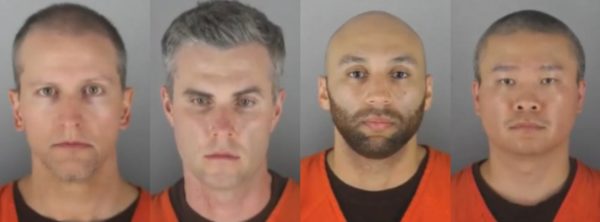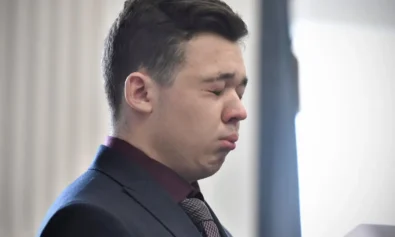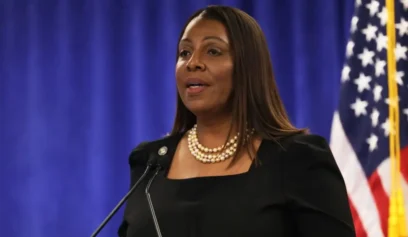On day two of the federal trial of J. Alexander Kueng, Thomas Lane and Tou Thao, a jury heard the testimony of the Minneapolis officer who oversaw the police medical training for two of the three former Minneapolis officers accused of violating George Floyd’s civil rights during the incident that cost the Black man his life.

She said under oath that the men did not follow the proper procedure they were taught in her class, and if they had chances for Floyd’s survival could have “doubled or tripled.”
Officer Nicole Mackenzie, an expert who testified in the 2021 Derek Chauvin murder case, was called as a witness on Monday, Feb. 7. During the second day of the federal trial for the three former cops present during the police-involved killing of Floyd in May 2020, Mackenzie explained that had the men followed the department’s rules, Floyd might not have died.
Mackenzie is the Minneapolis Police Department’s medical support coordinator. In this capacity, she served as the instructor for the police academy’s “emergency medical responder” class. Both Kueng and Lane were students in the class and learned basic first aid, ethics in care and how to hand people off to paramedics under her supervision.
While on the stand, prosecutor Allan Slaughter asked the officer to review body camera footage of Floyd’s detainment and eventual death.
As the clip played, Floyd was heard repeatedly saying, “I can’t breathe,” in response to Chauvin pressing his knee into his neck for nine-and-a-half minutes.
The video shows Floyd facedown on the ground and with his wrist handcuffed. While reviewing the tape, she assessed her former students, noting that their behavior was “inconsistent” with the departmental policies and what they had been trained to do in such instances.
According to the coordinator, Kueng and Lane should have stood from off Floyd. For other options, instead of restraining them as they had, she said, they could have sat him up or rolled him over onto his side.
Her training coincides with the testimony of the expert lung specialist, Dr. David Systrom.
That expert witness said the officers on the scene could have repositioned Floyd into a position that would have allowed him to breathe easier. The specialist also stated that Floyd’s survival chance would have “doubled or tripled” if those officers would have administered CPR as soon as they noticed his heart stopped.
Systrom, a noted pulmonary and critical care doctor at the Brigham and Women’s Hospital and assistant professor of medicine at Harvard Medical School, said Floyd died because his upper airway was compressed by Chauvin’s knee, as reported by the Los Angeles Times.
He added that Floyd’s uncomfortable positioning and the weight of two other officers assisted in oppressing him and did not allow his lungs to expand enough for him to breathe. The doctor said that he could not fully say if Kueng’s knee in Floyd’s abdomen added to the cause of death, but specifically said that the way Lane restricted Floyd’s legs impeded him from getting into a position where he’d be able to breathe properly.
“Oxygen delivered to the heart and brain is critical to survival,” Systrom said, later calling Floyd’s death “an eminently reversible respiration failure event.”
Mackenzie believes that if Thao had followed department rules and procedures that May 2020 day would have ended differently.
She said because Thao was inattentive and made no efforts to assist Floyd while he cried out in distress, he also was “inconsistent” with departmental policies.
On the stand, Mackenzie shared that it is standard for police to call the ambulance when a person is in distress or immediately administer CPR if a pulse is not located. She said, “As long as I’ve been around” those medical crisis practices had been in play.
She testified, “If you can’t detect a pulse after about 10 seconds, then you should begin CPR.”
According to earlier testimony in the federal trial, Chauvin told the officers not to get off him, and after Floyd became unresponsive with no pulse, they were to wait for an ambulance.
The men listened to Chauvin, as, with 19 years of experience, he was the most senior officer there.
Early Gray, the lawyer for former officer Lane, brought up that he had tried to get Chauvin to roll Floyd over onto his side. Chauvin shut down the suggestion. The attorney pointed out that his client was the first to call for an ambulance; directed Thao to upgrade the call to lights-and-sirens; asked Kueng to locate Floyd’s pulse and how, once Floyd was in the ambulance, performed chest compressions, hoping to revive him.
Gray asked Mackenzie, “He did pretty much everything he was trained to do at the school, correct?”
“To a certain degree, yes,” Mackenzie answered.
When asked why his actions were not enough, Mackenzie responded, “Suggesting aid and actually rendering aid are two very different things.”
The officers’ defense attorneys argued that the ex-cops did not receive adequate training, and didn’t know that Chauvin’s kneeling hold was not permissible. Robert Paule, the attorney who represented Thao, said that his client believed that Floyd was suffering from excited delirium, a frantic state of mind brought out in the Chauvin case by the convicted man’s defense.
Mackenzie explained the condition in that case, and how only a medical professional can say that Floyd was suffering from that condition. In April 2021, she told the jury when rookies are trained, they are taught how to recognize signs of excited delirium.
She shared that suspects might seem incoherent, could exhibit out-of-the-ordinary strength, a rise in their body temperature and start to sweat or inexplicably snap. According to her training, rookies are taught that cardiovascular disease, drug abuse or mental illness can cause suspects to experience excited delirium. Thao did not receive the training.
Lane, Kueng, and Thao are charged with willfully depriving Floyd of his constitutional rights while acting under government authority. The charges allege that the officers’ actions resulted in Floyd’s death. In June, the men also face a separate state trial on charges alleging that they aided and abetted murder and manslaughter.
Chauvin, the officer from whom the three took command, was convicted of murder and manslaughter in state court in November 2021. He was later sentenced to 22.5 years in prison and pled guilty to federal civil rights charges in December 2021.
More news from our partners:
‘Buy Black’ Made Gains in 2021 Even Against Pandemic Backdrop, Yelp Data Shows


